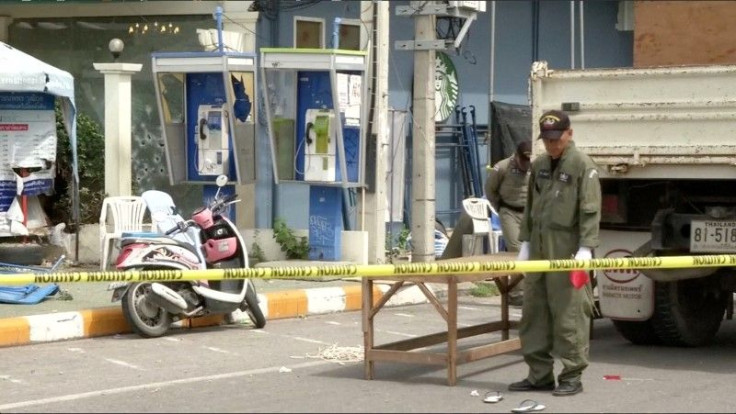Thai Police Find More Unexploded Bombs Following Coordinated Blasts

Thai police over the weekend found and defused five explosive devices that had failed to detonate when an as yet unidentified group carried out a series of deadly bomb attacks on popular tourist spots late last week.
Police said they had arrested one suspect following the bomb and arson attacks on Thursday and Friday that killed four people and wounded dozens more in some of Thailand's best-known southern resorts and islands.
The attacks came just days after Thais voted to accept a military-backed constitution that the ruling junta, which seized power in 2014, has said will lead to an election by the end next year.
"These acts were undertaken by a group in many areas simultaneously, following orders from one individual," Pongsapat Pongcharoen, a deputy national police chief, told reporters on Sunday, without elaborating.
No group has claimed responsibility for the attacks.
Analysts say suspicion would inevitably fall on enemies of the ruling junta aggrieved by the referendum results, or insurgents from Muslim-majority provinces in the south of the mostly Buddhist country.
Two incendiary devices in mobile telephone power packs were found in a market in the upscale resort of Hua Hin on Sunday, the interior ministry said in a statement. A bomb disposal team defused both, and local police said the devices had been there since Wednesday.
The resort was the scene of the most devastating of the wave of bombs when a blast ripped through an alley in a bar area on Thursday evening. There were two more blasts in the town less than 12 hours later.
Another fire bomb was found on the island of Phuket on Sunday and defused, local police said. It had been set to detonate at 3 a.m. on Friday (1600 ET on Thursday), local police said.
In Phang Nga, two devices were found on Saturday near a market that was torched in an attack early on Friday.
"One worked and the other two didn't," Phakaphong Tavipatana, the governor of Phang Nga, told Reuters, adding that police hoped to find fingerprints on the defused devices.
Phuket and Phang Nga were both hit in the attacks on Thursday and Friday, as was Surat Thani, a city that is the gateway to the popular islands in the Gulf of Thailand.
Attackers struck targets in seven southern Thai provinces, using bombs as well as incendiary devices that set shops and markets ablaze.
A man has been arrested and was being questioned in connection to an arson attack on a supermarket in the southern province of Nakhon Si Thammarat, Pongsapat said. Police believe more than one individual was involved in that attack, he said.
The movements of other suspects were being monitored, he added.
NO SCAPEGOATS
Prime Minister Prayuth Chan-ocha, the army chief who led the coup two years ago, has instructed the police to be thorough and cautious in their investigation, said Pongsapat, adding that police were "not catching scapegoats."
No evidence has been found yet to connect southern insurgents to the attacks, Pongsapat said, but DNA samples collected at the blast sites were being compared with databases in the southern Muslim provinces.
Fears that followers of former prime ministers Thaksin Shinawatra and his sister Yingluck Shinawatra could be blamed prompted a senior figure in their Puea Thai Party to issue a sharp denial on Saturday.
Thaksin's government was toppled by the military in 2006, while Yingluck's was ovethrown two years ago.
The anti-government United Front For Democracy Against Dictatorship (UDD), known as the "red shirt" group and sympathetic to the Shinawatras, condemned the attacks in a statement on Sunday.
© Copyright Thomson Reuters 2024. All rights reserved.







